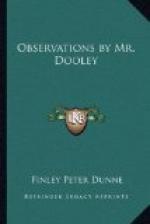“Now, Hinnissy, no matther what a man may’ve been wan minyit befure he was hit be a throlley car, a minyit afther he’s on’y a man. Th’ throlley car plays no fav’rites. It bounces th’ high an’ th’ low alike. It tears th’ exalted fr’m their throne an’ ilivates th’ lowly. So whin th’ prisidint got back to the earth he wasn’t prisidint anny longer but Tiddy Rosenfelt, 180 pounds iv a man. An’ he done accordin’ly. If it’d been Willum Jennings Bryan, he’d’ve ast th’ throlley engineer was he a mimber iv th’ Union. If he cud show a wurrukin’ card he was entitled to bump anny wan. At worst Willum Jennings Bryan wud’ve written an article about him in th’ Commoner, or if he felt unusually vindicative, maybe he’d sind it to him through th’ mails. Whin Sicrety Cortilloo come to fr’m a dhream that he’d jus’ rayfused a favor to Sinitor Tillman, he hauled out a little note book an’ got ready to take down something that cud be put on th’ thransparencies two years fr’m now—something like—’No power on earth can stop American business entherprise.’ But nawthin’ that will iver be printed in th’ first reader dhropped fr’m th’ lips iv th’ chief exicutive. With two jumps he was in th’ throlley man’s hair an’ spoke as follows—No, I won’t say it again. But I’ll tell ye this much, a barn-boss that was standin’ by an’ heerd it, said he niver befure regretted his father hadn’t sint him to Harvard.
“We know what Wash’nton said to his gin’rals an’ what Grant said to Lee an’ what Cleveland said to himsilf. They’re in th’ books. But engraved in th’ hearth iv his counthrymen is what Rosenfelt said to th’ throlley man. ’Twas good because ’twas so nachral. Most iv th’ sayin’s I’ve read in books sounds as though they was made be a patent inkybator. They go with a high hat an’ a white tie. Ye can hear th’ noise iv th’ phonygraft. But this here jim of emotion an’ thought come sthraight fr’m th’ heart an’ wint right to th’ heart. That’s wan reason I think a lot iv us likes Tiddy Rosenfelt that wudden’t iver be suspicted iv votin’ f’r him. Whin he does anny talkin’—which he sometimes does—he talks at th’ man in front iv him. Ye don’t hear him hollerin’ at posterity. Posterity don’t begin to vote till afther th’ polls close. So whin he wished to convey to th’ throlley man th’ sintimints iv his bosom, he done it in wurruds suited to th’ crisis, as Hogan wud say. They do say his remarks singed th’ hair off th’ head iv th’ unforchnit man.




